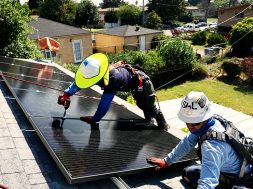
Mumbai housing society switches to solar power, saves Rs 2 lakh a month on electricity bills
Residents of a housing complex in Kandivli are leaving no stone unturned in reducing their carbon footprint. Be it rainwater harvesting, use of solar power, installation of LED bulbs, getting waste water treatment plants or maintaining a green cover, the 230 families residing in Raheja Eternity have gone all out to develop a sustainable living environment. The residents of the 20-storey building have reduced their dependence on the electricity grid by nearly 60% by using solar power generated in the premises. The residents collected Rs35 lakh to install a 65kW rooftop solar system to mark World Environment Day in June. Their energy conservation efforts, however, started before this. They replaced all regular lights in the building’s common areas with energy-efficient LED bulbs. “There are around 211 panels that generate around 260-280 units per day. But after we replaced all our society tube lights with around 650 LED bulbs, we have reduced our unit consumption substantially. Though the bulbs cost us around Rs80,000, it was worth it,” said Vishal Gharat, a resident of the society and its alternative energy coordinator.
The society which consume 863 units per day, now just draws 337 units from the electricity grid. The are saving around Rs2.2 lakh per month on electricity bills. “The maintenance (charges paid by each family) has also reduced by three times,” Gharat said. The building also has a wastewater treatment plant that reduces their reliance on public sources. “The treated water that we get is used in washrooms and helps us save a sizeable quantity of clean water,” said Sahu. Homes in the complex have recently installed water saving nozzles in taps which reduces the flow of water by half. “We tend to keep the tap open when we brush our teeth or while washing utensils. The nozzle helps reduce the flow from 8 litres to 3 litres a minute,” said Pradeep Surana, another resident. The society also has a rainwater harvesting system with several recharge and percolation pits. It also has a big storage tank.
They also nurturing 20 mango saplings in their lawn and terrace. “Once they grow to a desired size, we will plant these saplings in Sanjay Gandhi National Park. We want to live in a place that is better than it was when we got it,” said Ashish Shrivastava, another resident of the society.
In the pipeline
Within a month, the society aims to install sensor systems to ensure that the lights will switch on only when someone passes by the sensor. The move will also enhance the life of bulbs by nine times, said residents. Also, they will get two automated composting machines that can convert kitchen waste into compost in three days. “Our aim is to tap and exploit all possible areas which have an environmental impact. If we wish to become the role model of something good, we might as well do it perfectly,” said Ajay Singh Thakur, secretary of the housing society. The local municipal ward officer said the residents of Raheja Eternity are setting an example for other housing societies. Sahebrao Gaikwad, assistant commissioner, R/south ward, said, “Once the society took these initiatives, within months we came to know that other societies too took up similar projects and more wanted to join the green wave. The corporation is not worried for at least one area knowing that they will take care of all the aspects of the environment.”













